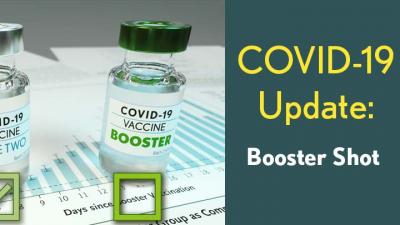COVID-19 Stakeholder Updates
Booster Shot Updates
Pfizer Booster for 12- to 15-Year-Olds
The Food and Drug Administration (FDA) authorized, and the Centers for Disease Control (CDC) recommended the COVID-19 Pfizer booster for children ages 12 to 15 years old. COVID-19 infections have skyrocketed to a seven-day daily average of more than 480,000 cases per day in the United States, and the number of children being hospitalized across the country is increasing. Getting a booster helps strengthen and extend protections against COVID-19.
Children 12 and up who received the Pfizer COVID-19 vaccine can receive the Pfizer booster five months after their second dose. Parental consent is required.
Adults 18 and older can receive any brand of COVID-19 vaccine for their booster shot.
The CDC also recommends a third dose of Pfizer for children ages 5 to 11 who are immunocompromised.
Moderna Booster Wait Time Reduced
The FDA now authorizes, and the Centers for Disease Control and Prevention (CDC) recommends individuals who received the Moderna COVID-19 vaccine get a booster dose after five months. This announcement from federal agencies comes just three days after the announcement of a shortened wait time for a booster from six months to five months for individuals who received the Pfizer vaccine.
Current recommendations for COVID-19 boosters are:
- Those who received the Moderna or Pfizer vaccine should get a booster five months after their last dose.
- Those who received the Johnson & Johnson vaccine should get a booster two months after their initial dose.
- Anyone ages 12 and older should receive a booster. It is important to get your booster as soon as you are eligible to strengthen your protection.
- Adults may continue to get any brand of the COVID-19 vaccine for their booster, while children 12 to 17 can only receive Pfizer. NCDHHS encourages individuals to speak with a doctor, nurse or pharmacist if they have questions about what booster is right for them.
Boosters are available anywhere COVID-19 vaccines are available. People do not need a doctor's note to get a booster shot. Individuals who want to receive a booster will need to know the dates of any past COVID-19 vaccinations as well as the vaccine brand they originally received. Paper vaccination cards are helpful but may not be necessary. At-home vaccination and free transportation may be available.
We have updated the information we shared with you previously with this latest update. Please share it and update your community:
- Read more in the NCDHHS press release here.
- Download and share the updated COVID-19 booster fact sheet.
- Print and share the updated community flyer on doubling up your protection.
- Download and share the updated booster graphic here.
To find a COVID-19 booster, or for more information about COVID-19 vaccines in North Carolina, visit MySpot.nc.gov or call the state’s COVID-19 Vaccine Help Center for free at 888-675-4567. Not all vaccines may be available at every vaccine location.
Isolation and Quarantine Guidance
The CDC also updated its guidance for isolation and quarantine. People with COVID-19 should isolate for at least 5 full days and wear a mask for an additional 5 days. People exposed to COVID-19 should quarantine for 5 days and wear a mask for an additional 5 days. However, people who are exposed to COVID-19 do not need to quarantine if they are vaccinated - including a booster for adults - against COVID-19. Because North Carolina remains in the CDC’s red zone with high community transmission, all North Carolinians should wear a mask.
NCDHHS encourages you to speak with a doctor, nurse or pharmacist if you have questions about COVID-19 boosters. As with all COVID-19 vaccines, doses are free for everyone, even if they don’t have health insurance and regardless of their immigration status.
To find a COVID-19 booster, or for more information about COVID-19 vaccines in North Carolina, visit MySpot.nc.gov or call the state’s COVID-19 Vaccine Help Center for free at 888-675-4567. Not all vaccines may be available at every vaccine location.
Testing and Treatment
As a reminder, you can find COVID-19 testing using our testing site finder. A treatment finder is also available through our website: Find COVID-19 Treatment.
Information Source: Hattie Gawande, Senior Policy and Intergovernmental Affairs Advisor, NC Department of Health and Human Services



